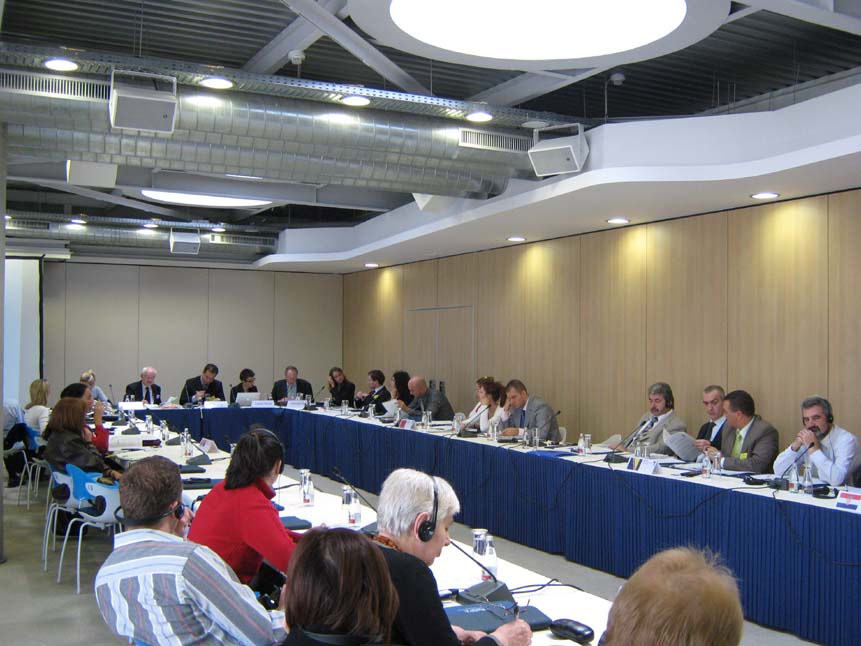
The third Annual conference in the organization of the ReSPA on the theme Coordinating accumulated volume of regulations, has been held in Belgrade on 23rd and 24th September. Theme of the conference is a logical subsequence of the previously held conferences which have been dealing with the question of significance of the good democratic administration and increasing competitiveness, and creating strategies of development through regulating economy and society.
The questions which have been elaborated during the conference are the ways and models of coordinating the accumulated volume of regulations which is evident in almost all countries, especially in those which are going through the process of democratization and transition.
It is evident that the restoration of electronic registers of regulations significantly eases the coordination of more important volume of regulations and increases their availability, exploration and analysis, and because of that, further development and affirmation of this instrument has been recommended.
Need for reduction of the volume of regulations also requires a periodical revision whether of the total judicial corpus, or of individual legislative fields through which at the same time it is being intervened in the way which increases consistence of legal system, by simplifying procedures and processes.
The instruments for better and more qualitative regulation which are included in the Strategy of the EU for improvement of regulative integration as a simplification, codification and consolidation as a center of the strategy for reducing the volume of legislation on the level of the EU have been presented as well.
Since this practice is not in the same volume and practice in application, the development of national policies of codification, consolidation, processing and adapting of legislation have been recommended in all countries.
As a factor which directly impacts the increased volume of regulations, the technique of creation of regulations (Nomo-technique) has been recognized, by which the focus is on clearness and simplicity of language and its significance has been pointed out as well.
Experiences of countries in the region
During the conference, experiences of countries in the region have been presented. The biggest progress has been done in the part of regulations which are related to regulation of business environment (regulatory guillotine, Fast-cut) by which the significant number of barred regulations and norms which string the business, have been removed from the law system.
As a result of this intervention, countries from the region have significantly improved their rating on the list of the World’s Bank in a sense of comparison of norms by which the business has been regulated (Doing Business , Measuring business regulations).
From the countries from the region, as the highest ranked on the list of those which have done more significant reforms in this segment, is the Ex Yugoslavian Republic of Macedonia (position 71).
Usually, the regulatory guillotine has been performed in the Republic of Srpska with the help of the project USAID Business Spira, and not long ago, with the help of the World’s Bank and FIAS it also began in the Federation of Bosnia and Herzegovina, and its finish is expected by the end of the mandate of the current Government.
In all countries in the region, the activities towards introduction of estimating the effect of regulations in the procedure of preparation and adopting the laws and other acts, mostly by financial and technical help of the World’s Bank, have started.
The grade is that by applying this instrument it can significantly impact the quality and performance of regulations which are being adopted. In a sense of institutional solutions which are being established by introduction of estimating the effect, the current solutions in the region are mostly similar, while the performance of this instrument according to some reports has been graded as the most progressed in Serbia (OECD, Report on the Implementation of the European Charter for Small Enterprises in the Western Balkans, 2007).
In Bosnia and Herzegovina, more initiatives for systematic introduction of this instrument have started. This has been anticipated by the Action plan 1 of the Strategy of the Public Administration Reform in BiH among which the most significant is the activity of the Directorate for the European Integrations of BiH on the pilot studies.
But considering the biggest number of authorities of administration included in this activity and more levels on which the regulations are being adopted, for the context of Bosnia and Herzegovina ensuring the adequate coordination and cooperation of participants of different levels in institutional and procedural establishment of the grade of effects of regulations into the legislative procedures, is of a special significance.
Qualitative contribution and assumption in this direction also present the Regulations for consultations in creating legal regulations which have been adopted by the Council of Ministries of BiH in 2006, and Common regulations for draft of legal regulations in institutions of Bosnia and Herzegovina adopted by the Parliamentarian Assembly of BiH in 2005.
The structure of the Delegation of Bosnia and Herzegovina on this conference, besides the member of the Administrative Board of the ReSPA from Bosnia and Herzegovina, Mr. Niko Grubešić, also consisted of the representatives of the Ministry of Justice of BiH, the Office for Legislation of the Council of Ministries of BiH and the Public Administration Reform Coordinator’s Office of BiH.
